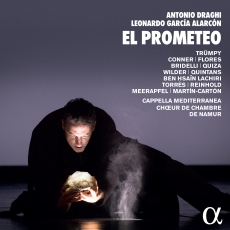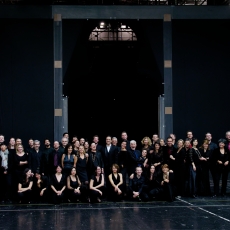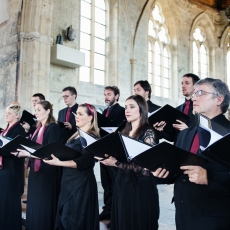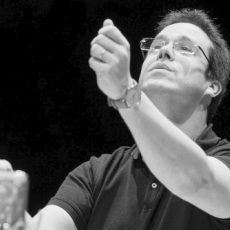Cappella Mediterranea, Leonardo García Alarcón & Chœur de chambre de Namur - El Prometeo - Planet Hugill
Something of a delightful curiosity, a 17th century opera in Spanish, composed by an Italian for performance in Vienna
Now this is a real curiosity, an opera written by an Italian composer, premiered in Vienna with a Spanish libretto. Antonio Draghi's El Prometeo (Prometheus) premiered in 1669, and is here revived on Alpha Classics by Leonardo Garcia Alarcon, Cappella Mediterranea and choeur de chambre de Namur with soloists Fabio Trumpy, Scott Conner, Mariana Flores, Giuseppina Bridelli, Borja Quiza, Zachary Wilder, Ana Quintans, Damil Ben Hsain Lachiri, Victor Torres, Anna Reinhold, Alejandro Meerapfel, and Lucia Martin-Carton. The final act of the opera does not survive, so has been completed by Leonardo Garcia Alarcon, and the recording was made following performances at Dijon Opera in 2018.
The composer Antonio Draghi was born in Rimini, Italy where his initial career was as a singer, and he sang in operas by Monteverdi and Cavalli, including in the premiere of Cavalli's Erismena. He arrived in Vienna in 1658 and spent the rest of his life in Imperial service, first as precentor in the Imperial chapel, then writing opera libretti and finally writing operas. He wrote some 160 dramatic works - operas, theatre pageants, ballets, oratorios. Most of these are unpublished, and like a lot of composers in Imperial service, once the work was performed the manuscript went into the Imperial library and works very rarely got further circulation (something that equally applies to the operas of Caldara).
Draghi was probably the brother of Giovanni Battista Draghi who was brought to London by King Charles II in the 1660s, and who pops up in Samuel Pepys' diary when G.B. Draghi sang to Pepys an Italian opera of his own composition
Draghi: El Prometo - Opera de Dijon (PHoto © Gilles Abegg - Opéra de Dijon) Draghi: El Prometo - Opéra de Dijon (PHoto © Gilles Abegg - Opéra de Dijon) The discovery of this particular opera was thanks to the realisation that the title of the piece was actually El Prometeo (Spanish) rather than Il Prometeo (Italian). The complete libretto survives, but unfortunately the music for the final act has still not been found in the Viennese archives, so in order to be able to perform the work Leonardo Garcia Alarcon wrote the final act.
The opera was mounted in 1669 at the Hofburg in Vienna in honour of the birthday of the Queen of Spain. Draghi had written the libretto in Italian as Benche vinto, vince Amore o il Prometeo before it was then translated into Spanish as Aun vencido, vence Amor o El Prometeo). The libretto may be based on a play La estatua de Prometeo (The Statue of Prometheus) by Calderon which was presented in Madrid in 1669. The opera is very early in Draghi's output, his first opera sole composer was in 1666. Quite who performed the opera is not clear, we are reliant on the surviving libretto for details. Did the Italian opera singers employed by the court sing in Spanish, or were Spanish singers imported, after all the Papal Chapel used Spanish falsettists (who had a tradition of singing high) to supplement the castrati. In fact, in 1669 the King of Spain was Charles IV and the regent was Queen Mariana of Austria, his mother. So the Queen of Spain entertained at the opera was a Viennese-born Hapsburg, so it is quite anyone's guess who actually understood any of the opera at the first performance.
It is a lively piece, very much in the tradition of Cavalli. Almost certainly Draghi's style is rather old-fashioned for the time and much influenced by the operas he had sung in as a young man. Draghi's libretto is teeming with incident, it merges the story of the nymph Tetis and Peleus (Achilles' parents) with that of Prometheus stealing fire and Pandora's box, with plenty of involvement from the gods. Caldaron's play, and to a certain extent the libretto, uses the device of antithesis, wisdom and knowledge against the passions of warfare.
The music of course requires a lot of fantasy to bring to life. Draghi's score for the first two acts has been realised by Leonardo Garcia Alarcon's assistant Aryel Rychter using a relatively small but lavish instrumental group (recorder, cornett, bassoon, sackbuts, violins, violas, cello, violas da gamba, double base, harp, archlute, theorbo, guitar, harpsichord, organ, percussion), 21 instrumentalists in all, based on the what we know about Draghi's instrumentation for his other operas, and the fact that this was given a private performance but one in the Imperial apartments for very distinguished audience!
The main thrust of the music is fluid arioso that is the basis for early 17th century Italian opera, bursting into short arias and ensembles. You can hear the way the aria will develop in later operas, but here we have a lively and fluid texture which very much aimed at enlivening the text. Every so often Spanish elements float through, though I am unclear whether this is music written by Draghi (with the intention of flattering the Spanish Queen) or whether the music has been Spanished up by Alarcon and Rychter. But it hardly matters.
The cast member are clearly having great fun, and the performance is lively and engaging, full of colour and incident. Unusually for opera of this period, there is no cross-dressing and all the women are women, and even the nurse character, Tetis' servant Aragne, is played by a woman. Similarly, the two heroes, Prometheus and Peleus are tenor and baritone, not a castrato in sight.
The music is full of colour and movement, with the score using the array of instruments skilfully to complement engaging performances from the singers. All is not up tempo liveliness, we have some lovely poignant moments and Act One ends with a fine love duet for Peleus and Tetis. Alarcon's completion of Act Three is convincing and rounds of the whole nicely.
The CD booklet includes a background article and an interview with Alarcon, plus text and translations, as well as photographs of the production at Dijon.
There are probably operas by Draghi which are more deserving of revival, but the sheer curiosity of this one makes it of great interest. And this lively, and energetic performance will win it many friends.



